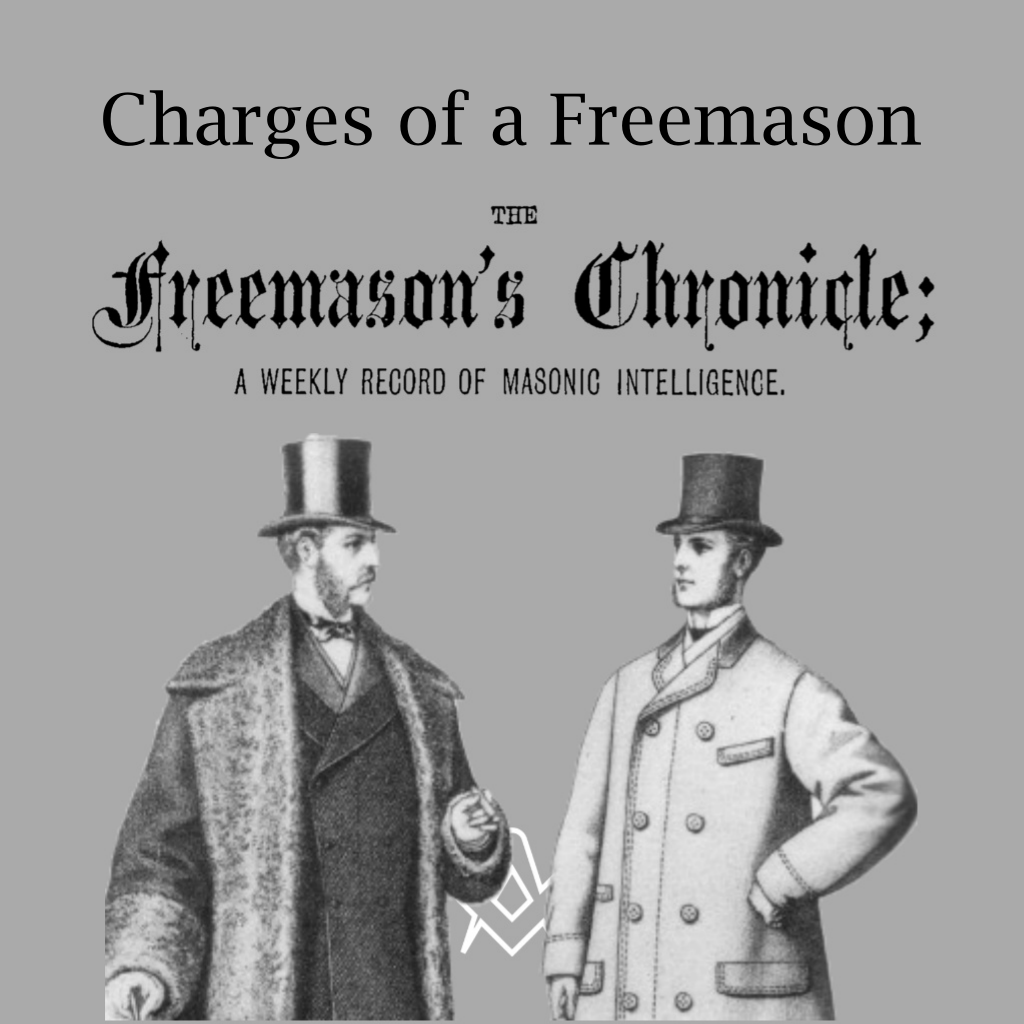While the Master must be faithful both to the employer and employed, the workmen are required to discharge their duty faithfully, and ” honestly finish their work.” They must not only complete their work, but they must complete it agreeably to the designs laid down upon the trestle board by the Master—” honestly finish” it; and that work which is usually done by journeymen, that is, expert and well-instructed workmen, must not be entrusted to inexperienced apprentices.
By CORNELIUS MOORE, Editor of The Masonic Review.
Each man should fill that place in the Lodge for which he is qualified, and discharge those duties only which his attainments and proficiency enable him to perform with fidelity and skill.
The reference is still to operative Masonry, and in that application is simple, plain and reasonable. Envy at the success or prosperity of another is a very foolish and very hurtful passion, and should never be indulged.
Prosperity is generally the result of a judicious and energetic application of these powers with which man has been endowed by his Creator, and instead of indulging envy at the success of another, the upright and well-instructed Mason will endeavour by similar industry to realize a similar prosperity.
No one should be supplanted in his work, or ” put out” of it, unless he is found incompetent to perform it. It is presumed that he understands the drafts, and fully comprehends the designs, or he would not have been put in charge of the work ; and, other things being equal, he is more likely to succeed than one who should take charge of it when partly finished.
These directions are all practical, and have a common sense application; the intelligent Mason will see their original appropriateness, and readily apply them, where applicable, to symbolic Masonry.
The Warden, both in operative and speculative Masonry, is the assistant of the Master in the discharge of his duties as overseer of the work. In the absence of the Master, the Warden succeeds to his duties, and then incurs all the responsibilities which rested upon his superior.
He stands between the lord, or proprietor, and the work-men, and must do justice to, and deal honestly with, both. He is presumed to be competent to discharge these higher duties, or he would not have been appointed as Warden, in which capacity he is liable at any time to succeed to the Masters chair.
And that he may be able to discharge those duties properly the workmen are bound to render him the same prompt and willing obedience they owe to the Master when ho is present and superintending in person.
In the absence of the Master, the Warden fills the place, discharges the duties, exercises the prerogatives, and has a right to the same homage and obedience as the superior officer; he is then Master for the time being.
There are two important duties required in this sentence, as indicated by the use of the word “shall.”
1 They shall not desert the Master until the work, on which they are engaged, is fully completed. How often, in conferring degrees, do brethren embrace an opportunity during a temporary pause in the work, perhaps at the close of a section, rise and ask leave to retire; and this is continued until scarcely enough are left to assist the Master in closing the Lodge.
This practice is very objectionable; it produces “confusion among the workmen;” is uncourteous to the Master; detracts from the solemnity and impressiveness of the work; and is expressly forbidden by the supremo law of the Order.
Permission to retreat such times should not be requested without an urgent necessity; and if the request is made in the absence of such necessity, it should not be granted. The Master should never give his consent for the members to disobey the law. In cities and large towns this objectionable practice is much more common than in rural districts, and “much of the work is injured, if not entirely ruined, by the non-observance of this wholesome regulation.
The other duty enjoined in this sentence is this: —that Masons should ” meekly receive their wages, without murmur or mutiny. “Order and harmony must be preserved; and though we may not always receive the reward we conceive due our merits, yet we shall receive what was promised, and with that we must be content.
We may have done more than others; we may have laboured longer; perhaps have ” borne the burden and heat of the clay,” and conceive ourselves entitled to an extra reward. But we should never forget that we engaged ” for a penny,” and having received that, wo should neither ” murmur ” nor ” mutiny.”
We have received our ” wages “—that for which we stipulated; and if the Master should best own equal reward upon those who have done less, we have no right to complain; he has done us no injustice, and ho has a perfect right to” do what he pleases with his own.”
“A younger brother shall be instructed in working” by the Master, or by someone selected for that purpose because of his competence and. his attitude in teaching. Indeed, it is the duty of every Mason to instruct, as occasion must offer, his less informed brethren.
The younger members are enjoyed to diligence in the study of the art and to improve in Masonic knowledge ” by conversation with older and better informed brethren, who will be always ” as ready to give as he will be to receive instruction.” The best evidence that a young Mason can give of his fitness for the Order, will be his diligence in the pursuit of Masonic knowledge.
If he sits down contented, as soon as his curiosity is gratified, it is a sure indication that an error was committed by admitting him. He may be a worthy citizen, but he will add neither strengthen nor adorn our mystic building.
The duty of instructing a younger brother is enjoined for two reasons: — to prevent spoiling the work, and to preserve and increase brotherly love, which is the “cement which, unites the building into one common mass.”
These are two very important considerations, and should have their proper influence in securing the observance of this important duty. A description of the tools—the rituals— our mystical implements —cannot he reduced to writing, but a knowledge of their character and use must be communicated by oral instruction. The Charges, therefore, have very wisely committed this matter to the keeping of the Grand Lodge. That body is composed of the Masters and Wardens of all the subordinate Lodges — the oldest and most experienced of the workmen, as it is to be presumed, and therefore the best judges of what the tools should be, and how they should be used. If any discrepancies arise in the work, or any doubts exist as to the proper tools, the Grand Lodge is the proper tribunal to deter-mine the matter, and the decision of that body should quiet all cavilling upon the subject.
The secrets of Masonry are the exclusive property of the Craft, and can never be communicated to one who is a mere labourer and not an accepted Mason. Hence, no ” labourer, that is, one who has not been regularly initiated in a legal Lodge, must ” be employed in the proper work of Masonry,” or permitted to be present when and where the Craft are engaged in their peculiar labours.
A sentinel is therefore placed at the door of every well governed Lodge to keep at a distance all such as are not entitled to enter it, that the secrets of Masonry may not be obtained by the ” profane” “Without an urgent necessity”—This had exclusive reference to operative Masonry in ancient times: when portions of the work had to be done outside the Lodge, and when ” unaccepted Masons” were sometimes required to aid in particular portions of the work. It can have no reference to symbolic Masonry, for no necessity can arise to require the “work” to be performed in the presence of those who have not been initiated. A Mason should never forget the charges to “keep sacred and inviolable the mysteries of the Order,” for by these he is to be distinguished from the rest of the community, and their preservation will convince the Craft of his integrity.
VI. ” Of Behaviour, viz.:
I. In the Lodge while constituted.—You are not to hold private committees, or separate conversation, without leave from the Master, nor to talk of anything impertinent or unseemly, nor interrupt the Master, or Wardens, or any brother speaking to the Master; nor behave yourself ludicrously or jestingly, while the Lodge is engaged in what is serious and solemn ;nor use any unbecoming language upon any pretence whatsoever; but to pay due reverence to your Master, Wardens, and Fellows, and put them to worship.
If any complaint be brought, the brother found guilty shall stand to the award and determination of the Lodge, who are the proper and competent judges of all such controversies (unless you carry it by appeal to the Grand Lodge), and to whom they ought to be referred, unless a lord’s work be hindered the meanwhile, in which case a particular reference may be made; but you must never go to law about what concerneth Masonry, without an absolute necessity apparent to the Lodge.
II, Behaviour after Lodge is over, and the Brethren not gone. —You may enjoy yourselves with innocent mirth, treating one another according to ability, but avoiding all excess, or forcing any brother to eat or drink beyond his inclination, or hindering him from going when his occasion calls him, doing or saying anything offensive or that may forbid an easy and free conversation; for that would blast our harmony, and defeat our laudable purposes. Therefore, no private piques or quarrels must be brought within the door of the Lodge, far less any quarrels about religion or nations, or state policy ;we being only, as Masons, of the Catholic religion above mentioned we are also of all nations, tongues, kindreds, and languages, and are resolved against all politics, as what never yet conduced to the welfare of the Lodge, nor ever will.
This charge has been always strictly enjoined and observed; but especially ever since the Reformation in Britain, or the dissent and secession of these nations from the communion of Rome.”
III. Behaviour when Brethren meet without strangers, but not in a Lodge formed.—Yon are to salute one another in a courteous manner as you will be instructed, calling each other Brother ; freely giving mutual instruction as shall be thought expedient, without being overseen or overheard, and without encroaching upon each other order or derogating from that respect which is due to any brother, were he not a Mason; for though all Masons are as brethren upon the same level, yet Masonry takes no honour from a man that he had before; nay, it rather adds to his honour, especially if he has deserved well of the Brotherhood, who must give honour to whom it is due and avoid ill manners.
IV. Behaviour in presence of strangers not Masons. —You shall be cautions in your words and carriage, that the most penetrating stranger shall not be able to discover what is not proper to be intimated; and sometimes you shall divert a discourse, and manage it prudently for the honour of the worshipful Fraternity.
V. Behaviour at home and in your neighbourhood, You are to act as becomes a moral and wise man; particularly, not to let your family, friends, and neighbours know the concerns of the Lodge etc.. but wisely to consult your own honour, and that of the ancient brotherhood, for reasons not to be mentioned here.
You must also consult your health, by not continuing together too late, or too long from home, after Lodge hours are past; and by avoiding of gluttony or drunkenness, that your families be not neglected or injured nor you disabled from working.
VI. Behaviour toward a strange Brother. —You are cautiously to examine him in such a metlod as prudence shall direct you, that you may not be posed upon by an ignorant false pretender, whom you are to reject contempt and derision, and beware of giving him any hints or knowledge.
But if you discover him to be a true and genuine brother, you are to respect him accordingly, and if he is in want, you must relieve him if you can, or else direct him how he may be relieved : you must employ him some days, or else recommend him to be employed: but you are not charged to do beyond your ability, only to prefer a poor brother that is a good man and true, before any other poor people in the same circumstances.
Finally all these charges you are to observe, and also those that shall be communicated to you in another way; cultivating brotherly love, the foundation and capstone, the cement and glory of this antient Fraternity; avoiding all wrangling and quarrelling, all slander and backbiting, nor permitting others to slander any honest brother, but defending his character, and doing him all good offices, as far as is consistent with your honour and safety, and no farther.
And if any of them do you injury you must apply to your own or his Lodge;
and from thence you may appeal to the Grand Lodge at the Quarterly Communication, and from thence to the annual Grand Lodge, as has been the ancient laudable conduct of our forefathers in every nation; never taking a legal course but when the case cannot be otherwise decided, and patiently listening to the honest and friendly advice of Master and Fellow, when they would prevent your going to law with strangers, or would excite you to pat a speedy period to all lawsuits, that so you may mind the affairs of Masonry with the more alacrity and success; but with respect to brothers or fellows at law, the Master and brethren should kindly offer their mediation, which ought to be thankfully submitted to by the contending brethren;
and if that submission is impracticable, they must, however, carry on their present process or law suit without wrath or rancour (not in the common way), saying or doing nothing which may hinder brotherly love, and good offices to be renewed and continued; that all may see the benign influence of Masonry, as all true Masons have done from the beginning of the world, and will do to the end of time.
AMEN, SO MOTE IT BE.
The Lodge is no place for conviviality, jesting or trifling and ludicrous conduct. We should go to the Lodge as Masons, and attend to no other business while there but Masonry. Order must be observed; the officers must not be interrupted in the discharge of their duty, nor any brother while speaking on a subject under consideration in the Lodge. A well governed Lodge should be, and is, a perfect model of order and regularity. Everything is done at the right time, in the right way, and with propriety and dignity.
There should be no jesting, especially while the Lodge is engaged in the solemn labours of the Craft. When the degrees are conferred with proper solemnity, they will make an impression that will favourably affect the whole future life of the novice; but mingle our solemn rites with laughing and jesting, anil the whole affair becomes ludicrous in the estimation of the candidate.
Masons should never forget that the Lodge room is dedicated to the holiest principles,—that it is a temple erected to God, whose awful presence is ever there. They should also remember the reverence and respect due from each brother, however exalted his station in life may be, to the officers and brethren while engaged in the labours of the Lodge room.
Quiet, order, and decorum should reign, and dignity and respect should be seen in the deportment of each individual brother. This would make the Lodge, as a place of resort, instructive and pleasant, where heart, and life, and manners, may all be improved.
—The Masonic Review.
 The Freemasons Chronicle, a weekly record of masonic intelligence, was first published 2nd January 1875 London, England as an independent weekly journal of masonic interest and continued for 27 years.
The Freemasons Chronicle, a weekly record of masonic intelligence, was first published 2nd January 1875 London, England as an independent weekly journal of masonic interest and continued for 27 years.
It should be the business of a journal devoted to the interests of the Order to attempt the removal of prejudices such as these, which, though they may have little perceptible influence upon the prosperity of the Fraternity, yet have the effect of preventing timid or ill-informed persons from enlisting under its banner.
It will not only attempt to keep pace with the growing literary requirements of the day, but it will seek to exhibit the Order to the non-Masonic world divested of its technical details, and clothed in the garb of Charity and Brotherly Love.
The questions of the hour, which exercise the minds of thoughtful men, will be handled freely and broadly, without any tinge of political or sectarian bias.
The memoranda of Masonic gatherings which will appear from week to week, will be full and accurate; and as free interchange of opinion is one of the best signs of life and vigour in any society, ample scope will be given for Correspondence on topics of interest to the Order.
If we may venture upon a new rendering of words which recent events have made memorable, we will say here, once and for all, that we will be keen men of business, and will spare no effort, consistent with honour, to achieve commercial success; but first, and before all things, we will prove to our brethren and the world that we are FREEMASONS.
Recent Articles: The Freemason's Chronicle
 Operative And Speculative Masonry Explore the fascinating transition from Operative to Speculative Masonry in our latest post. Discover historical insights from Augustus C. L. Arnold and Rev. Wm. P. Strickland, shedding light on Freemasonry's evolution and its enduring principles. Dive into the rich history and significant milestones that shaped modern Freemasonry. - The Freemason's Chronicle - 2 September 1876 |
 Discover the true essence of Freemasonry, an ancient order founded on the profound principles of love for God and man. It's a call to rise above mere appearances, to embody genuine virtue and benevolence, transcending societal pretense. Embrace the transformative power of simplicity, and let the authentic glories of Freemasonry inspire your path. |
 Discover the intriguing story of a man who became a Mason but openly professed his dislike for the institution. Unravel the peculiar circumstances that led him down this path and explore the unexpected consequences that followed. Dive into this thought-provoking account that challenges our notions of loyalty and reveals the complexities of human nature within the Masonic fraternity. |
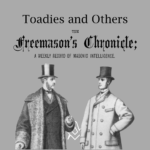 In the realm of Masonry, the principles of equality and respect are paramount. Yet, the presence of toadies—those who obsequiously seek favour from the influential—threatens these ideals. While Masonry embraces diverse beliefs and backgrounds, it rejects the sycophantic behaviours of toadies, flunkeys, and tuft-hunters, urging members to uphold genuine respect and self-worth. The Freemason's Chronicle - 22nd January 1876 |
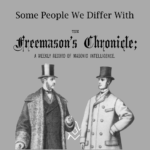 Unveiling the Unpleasant: Some People We Differ With Discover the intriguing dynamics of quarrels within the Masonic brotherhood. From the cantankerous to the litigious, the peevish to the vengeful, delve into the characters that challenge fraternal harmony. Explore their motives, temperaments, and the art of navigating disputes with these fascinating brethren. Brace yourself for a riveting journey into the world of conflicting personalities. |
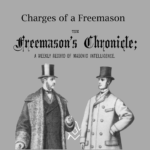 Unravelling the Masonic Mystique: A Deep Dive into the Freemasons' Charges - Explore the intricate world of Freemasonry, its principles, rituals, and the mechanisms for resolving internal disputes. Discover how this ancient fraternity fosters unity, promotes moral conduct, and upholds the sanctity of its secrets, while navigating the complexities of modern society. - The Freemason's Chronicle - 4 December 1875 |
 Unlock the hidden lessons of Masonic Studies! Don't settle for superficial knowledge or mere rituals. Discover the true depth and meaning behind Freemasonry. Expand your understanding of Tracing-Boards, Lectures, and more. Join regular Lodges of Instruction to enhance your Masonic journey. Become a knowledgeable Freemason, not just a token-bearer. Unleash the power of true Masonic wisdom today! |
 Uncover the incredible story of how Masonry saved the life of a Crimean War foot soldier in this historical and masonic account. Through the first hand experience of a soldier engaged in fierce hand-to-hand combat, witness the fateful encounter with a Russian Freemason that changed the course of his life. Learn how brotherhood and a deep dedication to the craft can lead to unforeseen and life-saving circumstances on the battlefield. |
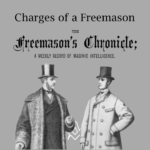 The Freemason's Chronicle - Charges of a Freemason The secrets of Masonry are the exclusive property of the Craft, and can never be communicated to one who is a mere labourer and not an accepted Mason. Hence, no labourer, that is, one who has not been regularly initiated in a legal Lodge. Article first published in The Freemason's Chronicle, 27 November 1875 |
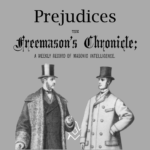 The Freemason's Chronicle - Prejudices Prejudices are partial judgments in favour of, or against certain persons or things, and, for convenience sake, may be ranged in two categories—those which are, comparatively speaking, harmless, and those which are harmful. Article first published in The Freemason's Chronicle, Oct. 2 1875. |
 The Freemason's Chronicle - Cliques Is Freemasonry - a Clique ? Man has been defined as a gregarious animal, but in his highly civilised condition he is gregarious only to a limited extent. First published in The Freemason's Chronicle, Oct. 2 1875, addresses the same challenges then as now. |
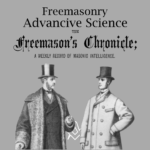 The Freemason's Chronicle - Freemasonry - an Advancive Science Is Freemasonry - an Advancive Science ? Not to confuse advancement with innovation. Has it been the case that Freemasonry's survival for 300 years plus is due to being an Advancive Science, tending to advance. First published in The Freemason's Chronicle 18 September 1875, addresses the same challenges then as now. |
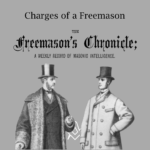 The Freemason's Chronicle - Charges Of A Freemason An interpretation of the "Charges of a Freemason", written Bro. Cornelius Moore and published in 1875, that introduce certain opinions that for some readers, will not sit well in contemporary times. - The Freemason's Chronicle, Sept. 11, 1875 |
 On The Order Of The Temple And Its Doctrine. THE Order of the Temple is divided into two great classes, denominated respectively the Order of the Temple and the Eastern Order. The Eastern Order gave birth to the Order of the Temple, and in the course of time has become an appendage of the latter. It is in ancient Egypt that we find the cradle of the Eastern Order. The Freemason's Chronicle, Sept. 4, 1875 |
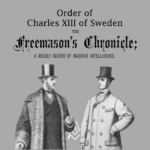 Order of Charles XIII of Sweden The following translation of the Manifesto of King JL Charles XIII of Sweden, on the occasion of his establishing the Masonic Order which bears his name, and of the Statutes of the said Order, may be interesting to our readers. The Freemason's Chronicle, Aug. 28, 1875 |
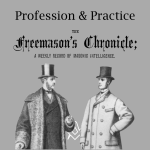 Most of our readers in the course of their experience, have doubtless met with enthusiastic brethren who take it for granted that a Mason can do no wrong. These enthusiasts are thoroughly convinced that the vast majority of those who join the Order are the most benevolent, the most moral, and the very noblest members of society. - The Freemason's Chronicle 10 July 1875 |
 An article investigating the relationship between masonry and citizenship. Are the principles of Freemasonry aligned with the freemason's claim to be a better citizen of the world? The Freemason's Chronicle - 19 June 1875 |
 A visitor must make clear his identity to the satisfaction of the Lodge he proposes to visit. More than once have we been asked to explain our views as to the reception of strangers in a Lodge. - The Freemason's Chronicle - 29 May 1875 |
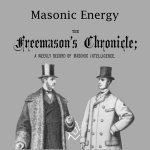 Is there reason in the accusation that Masonic energy looks only to a course of good feeds, when we can point to such grand results as have been achieved in these latter years, both in respect of the extension of our Order ? - 1May 1875 |
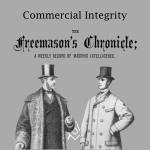 Implementing Freemasonry's peculiar system of morality in our day to day business affairs was the topic of this article, Commercial Integrity, first published in The Freemason's Chronicle - 8 May 1875 |
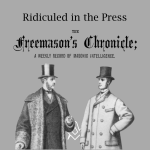 Ridicule has been somewhat illogically described as the test of truth. If it were so, Freemasonry ought to have perished long since. Two press reports from May 1875 covering the |
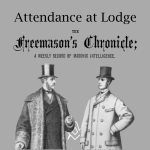 There are many things which Freemasonry will do for a man in the way of opening his mind and giving him larger and kindlier views of life, but Freemasonry itself, cannot eradicate the natural bias of the disposition. |
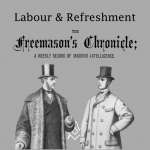 There is, we fear, too marked a tendency in very many Lodges to hasten through its labours, with a view to entering, as soon as possible, upon the business of refreshment. - The Freemason's Chronicle 17th April, 1875 |
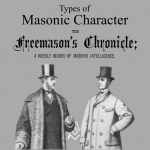 Another example that demonstrates that nothing really changes in Freemasonry. In an article the Types of Masonic Character published 145 years ago in The Freemason's Chronicle 10th April, 1875 |
 A brief history on the relationship between the British Monarchy and the craft - The Freemason's Chronicle 20th March , 1875 |
 What are the qualities of a convivial man and how does this dovetail perfectly in to Freemasonry ? 16th March, 1875 |
 A review of the "Sketch for the History of the Dionysian Artificers," a fragment, by Hyppoli to Joseph Da Costa - This little work may be regarded as, so to speak, the Holy Grail of Masonry. |
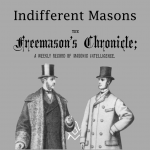 Nothing really changes, an article Indifferent Masons, From Le Monde Maçonnique 1874. Translation published in The Freemason's Chronicle 20th February, 1875 |
 In handling an intruder in the lodge, we endeavoured to show that a good Mason should be a gentleman, and a sincere man. The Freemason's Chronicle 20th February, 1875 |
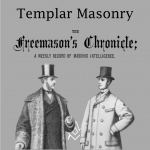 Templar Masonry - a historical aspect of the Religious and Military Order of the Temple published in The Freemason's Chronicle 13th February, 1875 |
 Secrecy perhaps the strongest objection urged by the enemies of the Masonic Order against its existence published in The Freemason's Chronicle 20th March 1875 |
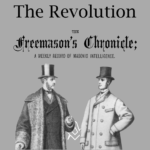 Freemasonry In The United States during And After The Revolution We take a look at Freemasonry in the United States during and after the Revolution first published in The Freemason's Chronicle - February 6, 1875 |
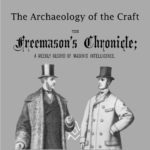 We take a look at the archaeological connection with the Craft, first published in The Freemason's Chronicle - January 30, 1875 |
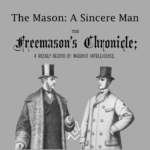 What it means to a Freemason to be a sincere man. Extract: first published in The Freemason's Chronicle - January 23, 1875 |
 What it means to a Freemason to be a citizen of the world ? First published in The Freemason's Chronicle - January 16, 1875 |
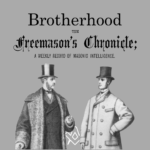 Brotherhood! In that one word what sympathetic associations arise. First published in The Freemason's Chronicle - January 9, 1875 |
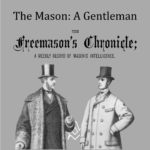 This opening article was written 145 years ago, yet it resonates with Freemasons today as it did then. First published in The Freemason's Chronicle, January 2, 1875, Issue 1 |
masonic knowledge
to be a better citizen of the world
share the square with two brothers

click image to open email app on mobile device


